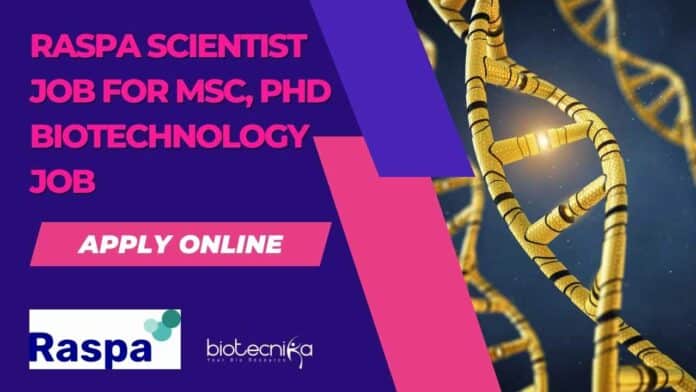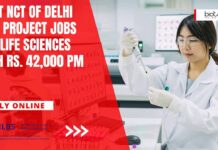Raspa Scientist Job For MSc, PhD Biotechnology Job – Apply Online
Raspa Scientist Job For MSc, PhD Biotechnology Job – Apply Online. MSc, PhD Biotechnology, Bio-chemical engineering, Bioprocess Engineering candidates can apply for Senior Scientist, Upstream Processing at Raspa. Interested and eligible applicants can check out all of the details on the same below
Senior Scientist, Upstream Processing
Lucknow
Fulltime
Research And Development
Raspa is a biopharmaceutical company that is committed to reducing the cost of treatment for cancer and other severe diseases. Our diverse and inclusive team is amalgamating technological innovation and automation strategies to make healthcare more accessible, affordable, and sustainable. We are looking for a talented upstream processing expert with proven leadership skills to join our dynamic organization. Qualified individuals will play a leading role in upstream process development; scale up, and technical support of cGMP manufacturing for small molecules, proteins, and biosimilars. This position is expected to be mainly hands on in the laboratory. The person will be reporting directly to the CEO.
You will:
- Design, execute, and analyze experiments targeted towards upstream process development and optimization
- Design experimental work independently or with minimal supervision
- Participate in technology transfer and successful scale-up of processes from lab to pilot to commercial scale. As needed, support process validation, including validation protocol writing, execution and report writing.
- Set-up robust SOPs in line with EU-GMP and FDA standards
- Guide cross functional teams in strain improvement efforts and process scale up
- Develop and implement green processes that optimize recovery rate while promoting the company’s sustainability goals
- Implement Design-of-Experiment & Statistical Process Control principles for efficiently studying response variables and assessing data quality
- Identify and implement new systems and processes to drive quality, efficiency, and cost-savings
- Show proficiency in cell culture, molecular biology, protein expression, and various analytical techniques
- Be responsible for authoring and reviewing of relevant regulatory sections
- Generate, manage, evaluate, and maintain critical data in a highly organized manner. Provide reports for assessment by senior management
- Maintain a functioning bioprocess lab including equipment maintenance and critical supply management
Our ideal candidate will have:
- Master of Technology or PhD degree in Biotechnology, Bio-chemical engineering, Bioprocess Engineering or a related discipline with 4-6 years, or 2-4 years of relevant industrial experience respectively
- Experience in microbial fermentation/cell culture operations and recovery processes, including shake flask expansion, small and large scale fermenter/bioreactor production, scale-up/scale-down, and process transfer
- Hands-on experience in handling equipment such as glass fermenters, autoclave, analytical HPLC, and tangential flow filtration (TFF) systems
- Ability to work and collaborate in cross functional teams such as research, development, and manufacturing in a fast pace and dynamic team setting
- Ability to think critically, demonstrate troubleshooting and problem-solving skills
- Ability to independently make decisions based on data, scientific knowledge, and sound judgement
- A can-do attitude, intellectual curiosity, strong time management skills, a sense of ownership of work, and the ability to be flexible to business needs
- Ability to adapt to a fast-paced environment and able to adjust workload based upon changing priorities
- A clear willingness to “roll up their sleeves” and dive into the details
- Ability to work in shifts
- Ability to lift up to 20 kgs
Nice to have:
- Previous experience of working with flexible schedule
- Knowledge of current process technology trends in the field
- Experience with automation technologies is desired
Here are 5 possible interview questions that could be asked in the technical round for the Senior Scientist, Upstream Processing position, along with their answers:
- Question: Can you describe your experience with upstream process development and optimization? Answer: Certainly. I have successfully designed and executed experiments aimed at optimizing upstream processes, including microbial fermentation and cell culture operations. My experience spans both small and large-scale fermenter/bioreactor production, scale-up, and process transfer. I have also worked with recovery processes, utilizing equipment such as analytical HPLC and tangential flow filtration systems.
- Question: How do you ensure compliance with regulatory standards, specifically EU-GMP and FDA, while setting up Standard Operating Procedures (SOPs) in upstream processing? Answer: Ensuring compliance with regulatory standards is of utmost importance. I have a solid track record of setting up robust SOPs that align with EU-GMP and FDA requirements. These procedures are meticulously developed to meet the highest quality and safety standards, and I consistently stay updated with any relevant changes in regulations.
- Question: Could you share an example of a situation where you had to lead cross-functional teams in strain improvement efforts and process scale-up? Answer: Certainly. In a previous role, I led a cross-functional team consisting of members from research, development, and manufacturing departments. We worked collaboratively to enhance strain performance and scale up the upstream process for a protein production project. By leveraging each team member’s expertise, we successfully increased production efficiency by 30% within six months.
- Question: How do you approach the implementation of Design-of-Experiment (DoE) and Statistical Process Control (SPC) principles in upstream processing? Answer: I’m well-versed in utilizing DoE and SPC principles to enhance process efficiency. When implementing DoE, I carefully design experiments to efficiently study response variables and assess data quality. SPC is employed to monitor and control processes, ensuring they remain within specified parameters. Both methodologies contribute to data-driven decision-making and process optimization.
- Question: Can you discuss your experience in handling critical data and generating reports for senior management? Answer: Absolutely. I have a proven track record of managing critical data in a highly organized manner. I ensure that data generated from experiments and processes are accurately recorded, evaluated, and maintained. This data forms the basis of comprehensive reports that I prepare for assessment by senior management. The reports include insights into process performance, key findings, and recommendations for further improvement.
Remember, these answers are based on the information provided in the job description. Tailor your responses to your actual experiences and achievements to make them more authentic during the interview.
Editor’s Note: Raspa Scientist Job For MSc, PhD Biotechnology Job – Apply Online. Please ensure you are subscribed to the Biotecnika Times Newsletter and our YouTube channel to be notified of the latest industry news. Follow us on social media like Twitter, Telegram, Facebook






























